Honoring Science of the Highest Caliber in Germany
The Gottfried Wilhelm Leibniz Prize

On March 13, 2019, Prof Dr Ayelet Shachar, Director at the Max Planck Institute for the Study of Religious and Ethnic Diversity, was awarded the prestigious Gottfried Wilhelm Leibniz Prize.
The Leibniz Prize is Germany’s highest and most prestigious research award. Honoring researchers who have distinguished themselves with extraordinary academic achievements, it offers them impetus to continue to produce outstanding work in the future. In order to fulfill the expectations associated with the award, Leibniz prizewinners receive a generous sum of money. No strings attached: Completely waived of any administrative constraints, they are free to use these funds as they see fit to further the progress of their research.
The Leibniz Prize Laureates 2019

From left to right: Prof. Dr.-Ing. Matthias Wessling, Dr. Melina Schuh, Prof. Dr. Michèle Tertilt, Prof. Dr. Ayelet Shachar, Prof. Dr. Wolfgang Wernsdorfer, Federal Minister Anja Karliczek, Prof. Dr. Hans-Reimer Rodewald, Prof. Dr. Rupert Huber, Prof. Dr. Brenda Schulman, die Bremer Wissenschaftssenatorin Eva Quante-Brandt, Prof. Dr. Andreas Reckwitz, Prof. Dr.-Ing. Sami Haddadin und DFG-Präsident Prof. Dr. Peter Strohschneider
From left to right: Prof. Dr.-Ing. Matthias Wessling, Dr. Melina Schuh, Prof. Dr. Michèle Tertilt, Prof. Dr. Ayelet Shachar, Prof. Dr. Wolfgang Wernsdorfer, Federal Minister Anja Karliczek, Prof. Dr. Hans-Reimer Rodewald, Prof. Dr. Rupert Huber, Prof. Dr. Brenda Schulman, die Bremer Wissenschaftssenatorin Eva Quante-Brandt, Prof. Dr. Andreas Reckwitz, Prof. Dr.-Ing. Sami Haddadin und DFG-Präsident Prof. Dr. Peter Strohschneider
A Tribute to Laureate Ayelet Shachar
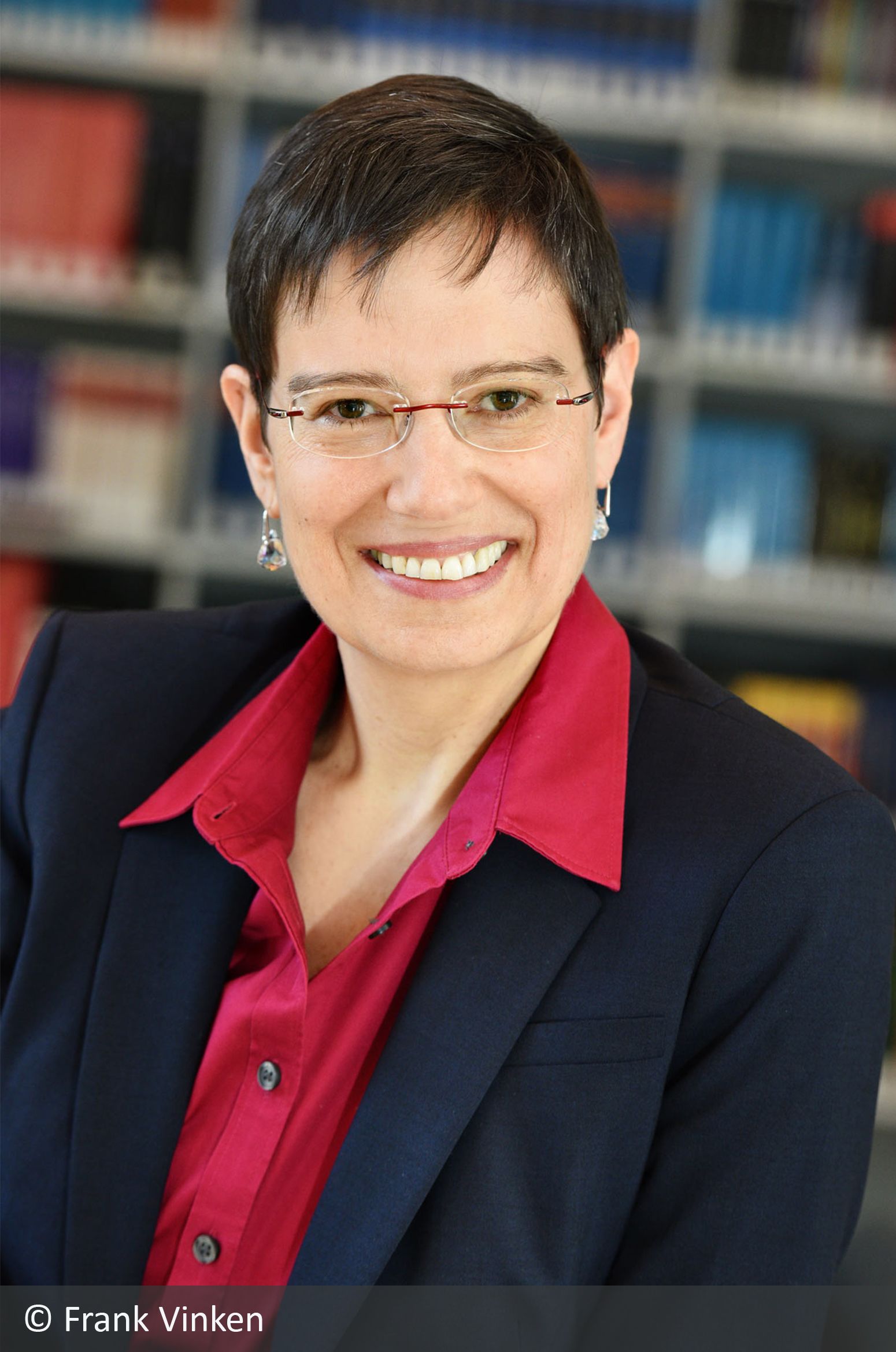
Prof Ayelet Shachar is Director at the Max Planck Institute for the Study of Religious and Ethnic Diversity in Goettingen, Germany
Prof Ayelet Shachar is Director at the Max Planck Institute for the Study of Religious and Ethnic Diversity in Goettingen, Germany
Leipzig Prize Laudatio for Prof Ayelet Shachar
Given by DFG President Strohschneider
Video Portrait Shachar © DFG
In the USA, the political dispute over the construction of a wall to Mexico has become an all-or-nothing issue. In Europe, too, border security issues are increasingly being discussed and facts relating to them have long since been created outside of our borders. And although border issues initially appear to be clearly defined local problems, in individual cases they do have meaning much beyond that. Ayelet Shachar aptly calls the coincidence of being born on one or the other side of border a birthright lottery, thus the title of her second book "The Birthright Lottery: Citizenship and Global Inequality" (2009). Not only was this book chosen as an ‘International Ethics Notable Book’ in 2010, it also cemented Shachar’s leading role in multidisciplinary research on global justice and migration.
Her first book “Multicultural Jurisdictions: Cultural Differences and Women’s Rights” attained worldwide resonance. In this work, Shachar deals with the status of women in religious minorities and analyzes the tensions between traditions, religious diversity and the general norm of gender equality. The book was awarded the ‘Best First Book Award’ of the American Political Science Association in the Foundation of Political Theory Section.
Shachar’s work is characterized by nuanced deliberations of justice that make it internationally relevant. Contrary to the often narrow orientation of legal studies towards current, mostly national law, Shachar has exemplarily implemented the interdisciplinary and transnational orientation that has been increasingly demanded of legal research. Due to the fruitful combination of different perspectives and bodies of knowledge, her publications have gained great influence - not only worldwide, but also in varying fields such as gender studies, philosophy and political science.
Shachar's extraordinary intuition for selecting amongst contemporary issues, those requiring further scientific scrutiny and her ability to do this with methodical foresight, make her an exceptional researcher, both in the German research landscape and internationally.
She studied politics and law at Tel Aviv University and earned her doctorate in 1997 at Yale Law School in the USA. She subsequently held various teaching positions at the University of Toronto, where she was appointed the Canada Research Chair in Citizenship and Multiculturalism in 2007. Since 2015, she has been Director at the Max Planck Institute for the Study of Religious and Ethnic Diversity in Goettingen (MPI MMG).
Prof Strohscheider ended the Laudatio on a personal note: “I am delighted to honor you with the Leibniz Prize. May this award enable you to continue finding ways to demonstrate to the societies we live in, the tensions and contradictions that exist within them, and the ways to deal with them in a civilized manner. Congratulations”.
***
We at the MPI MMG would also like to extend our heartfelt congratulations to Ayelet! We are proud to work for and alongside such an eminent scholar and corroborate on the fruits of her future research.


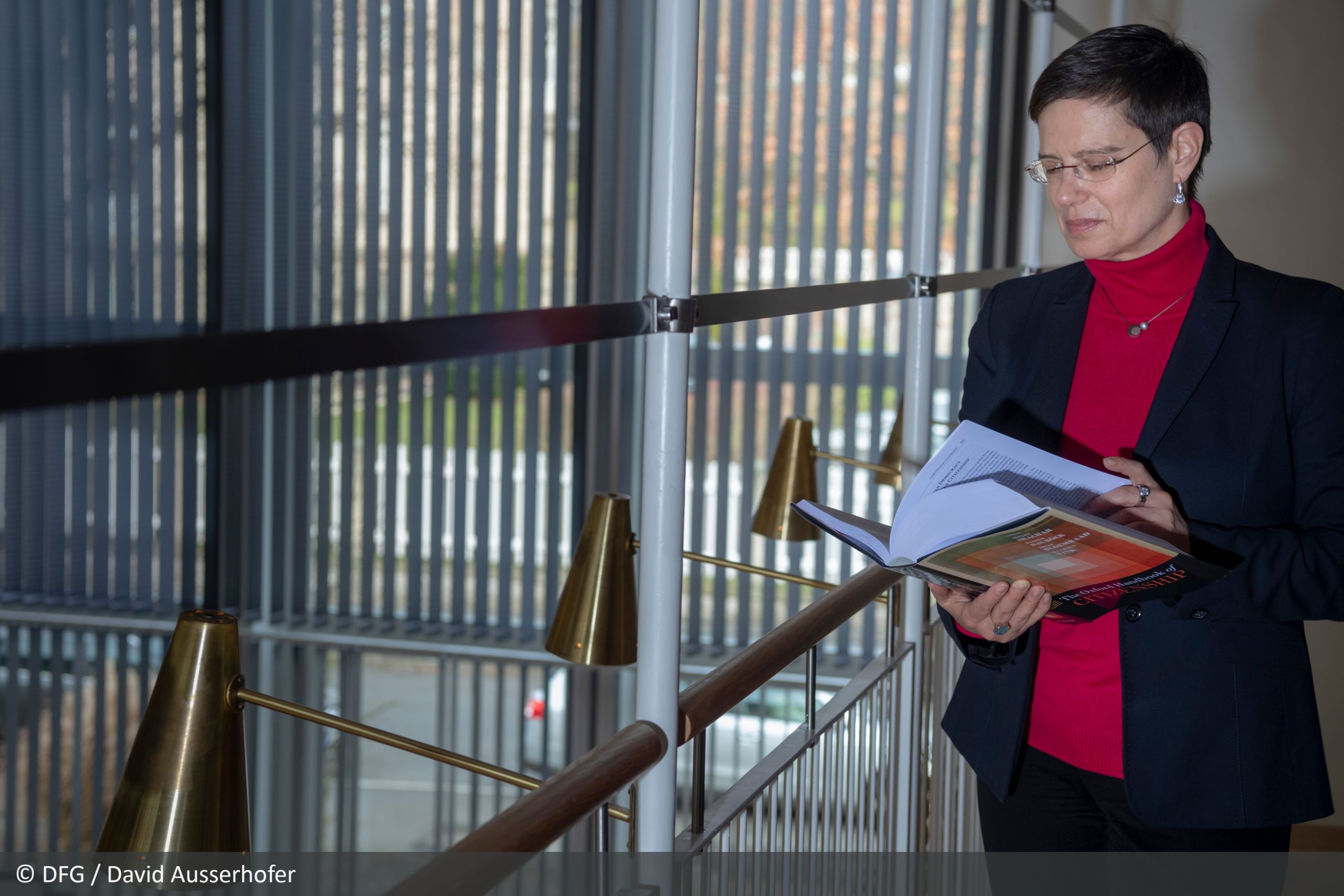


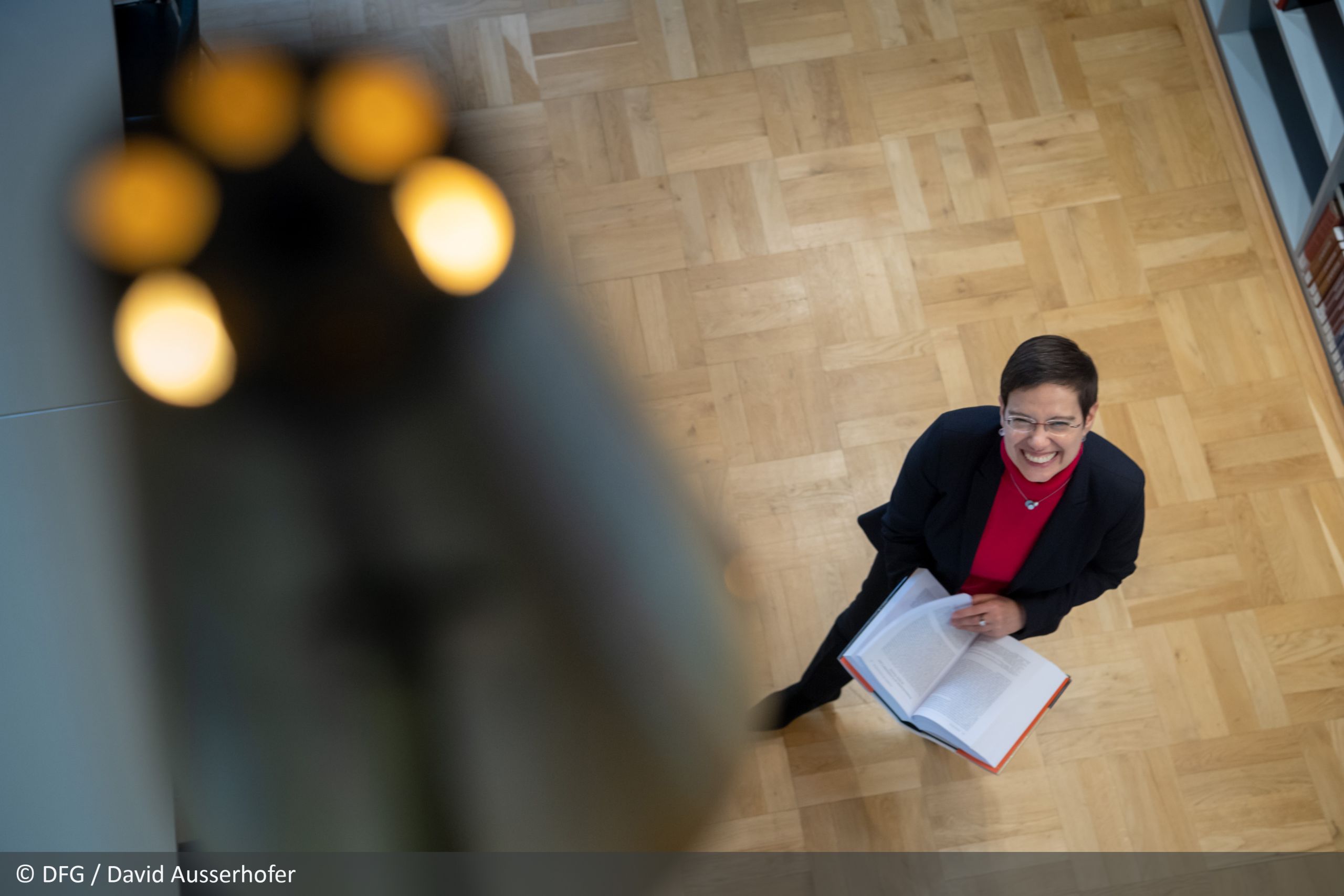
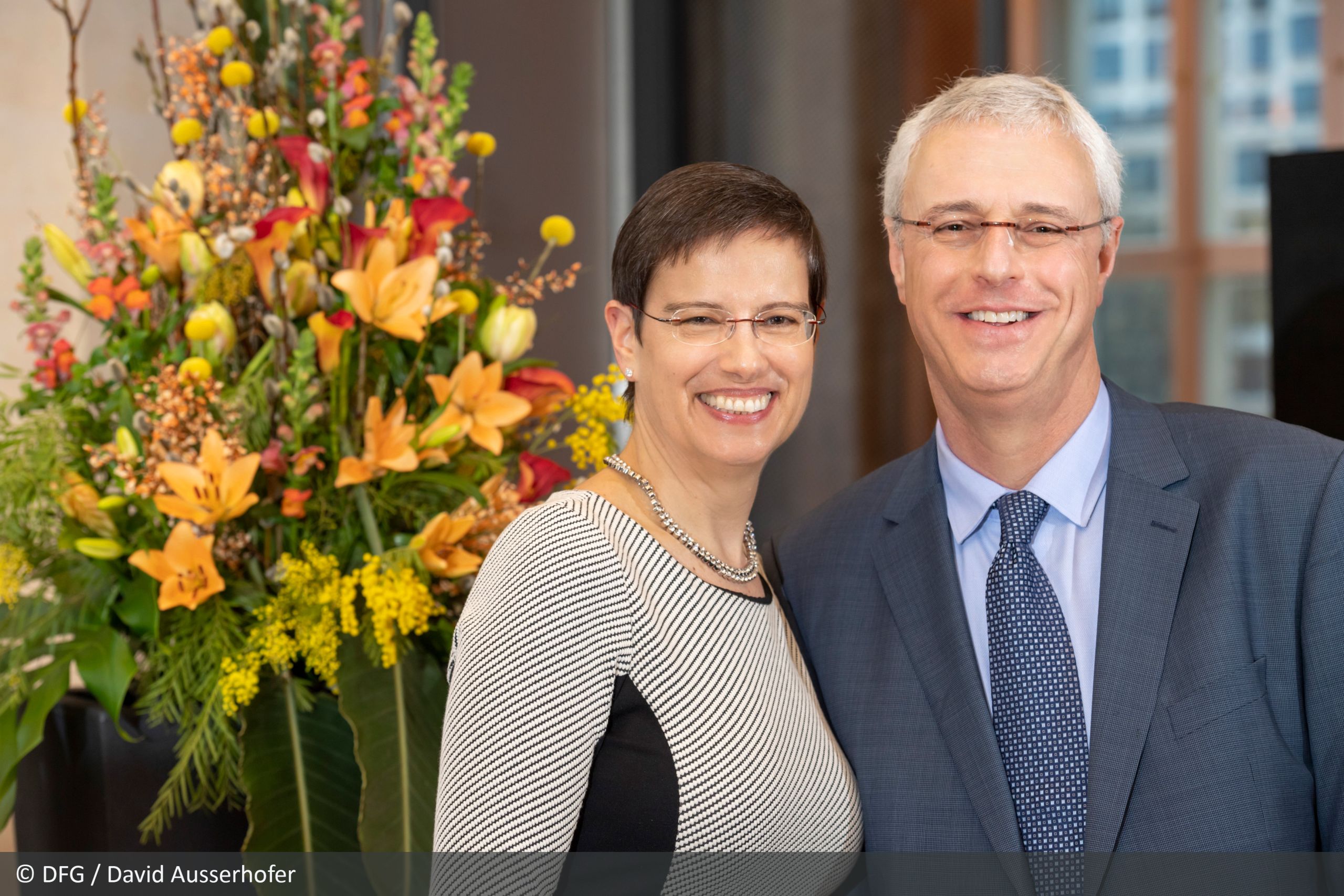
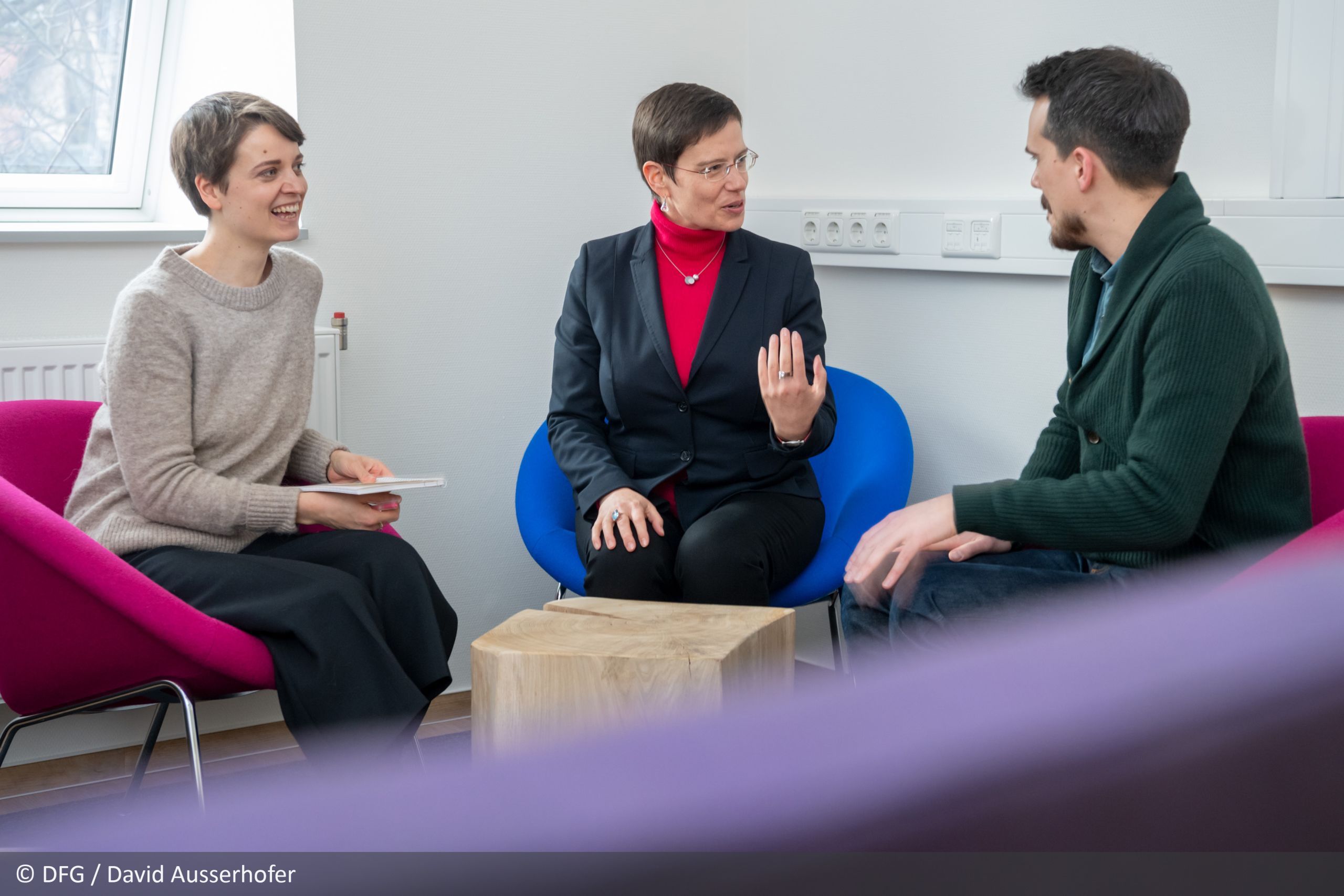
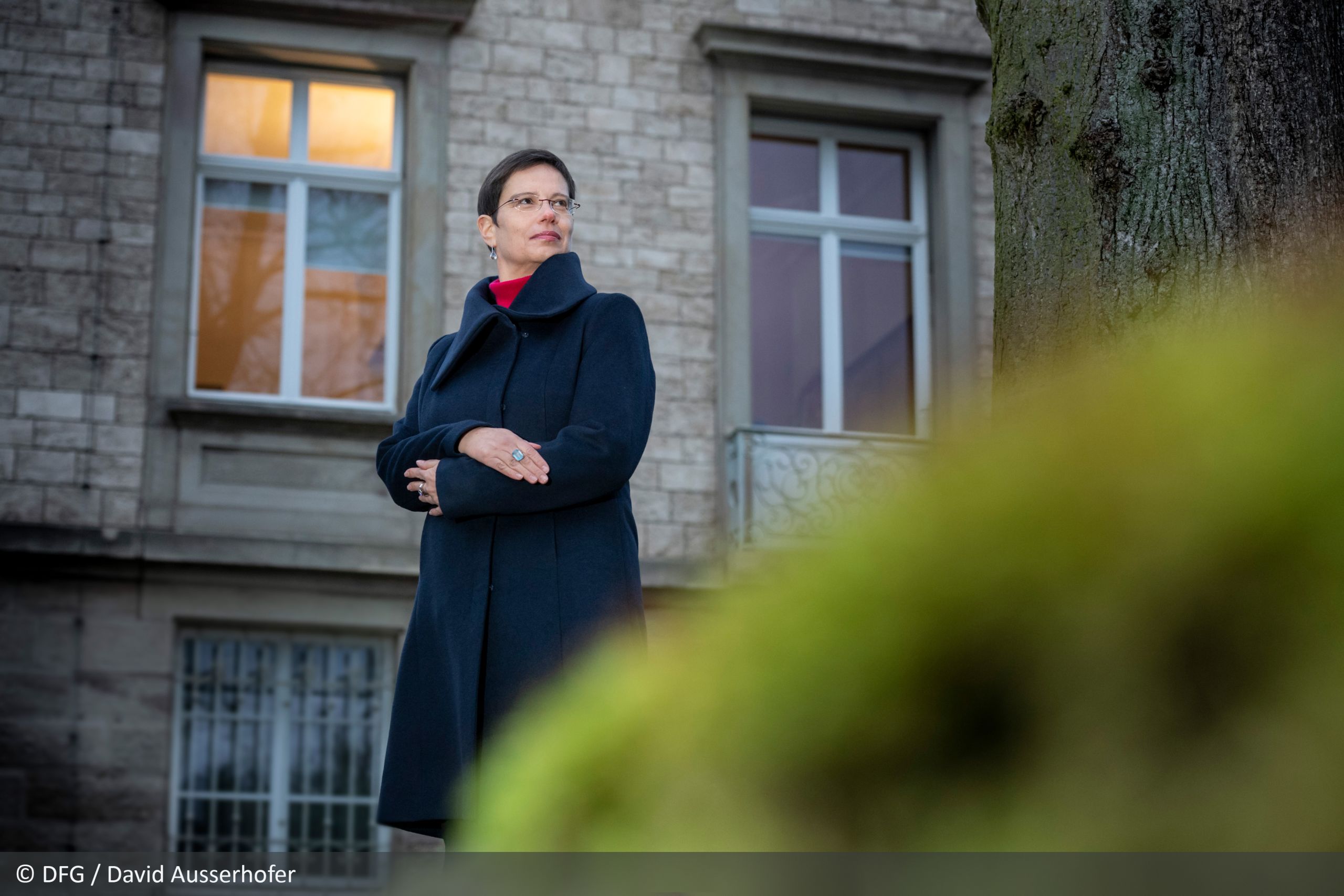
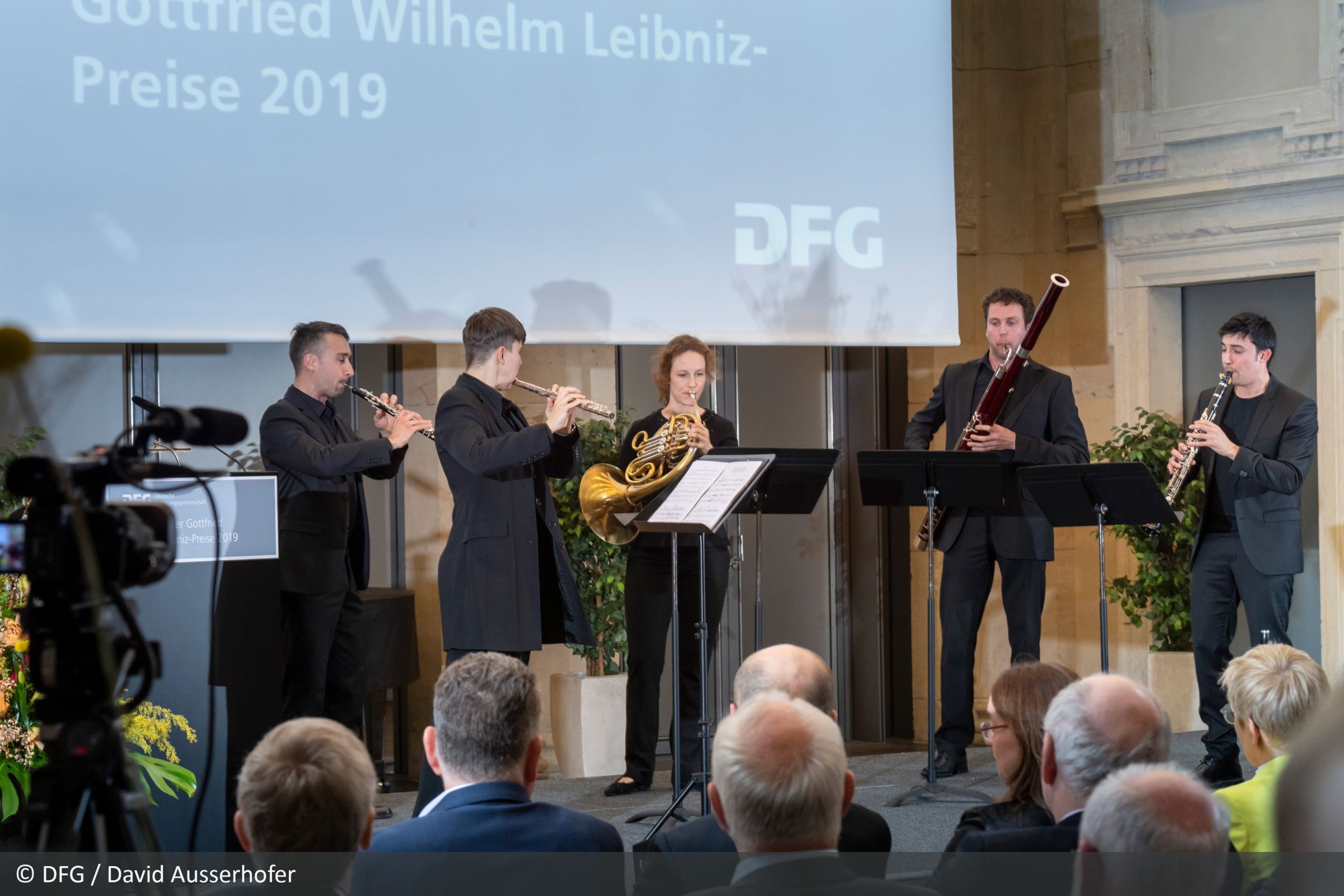
Musical Accompaniment: Wind Quintet 5 Beaufort
Musical Accompaniment: Wind Quintet 5 Beaufort
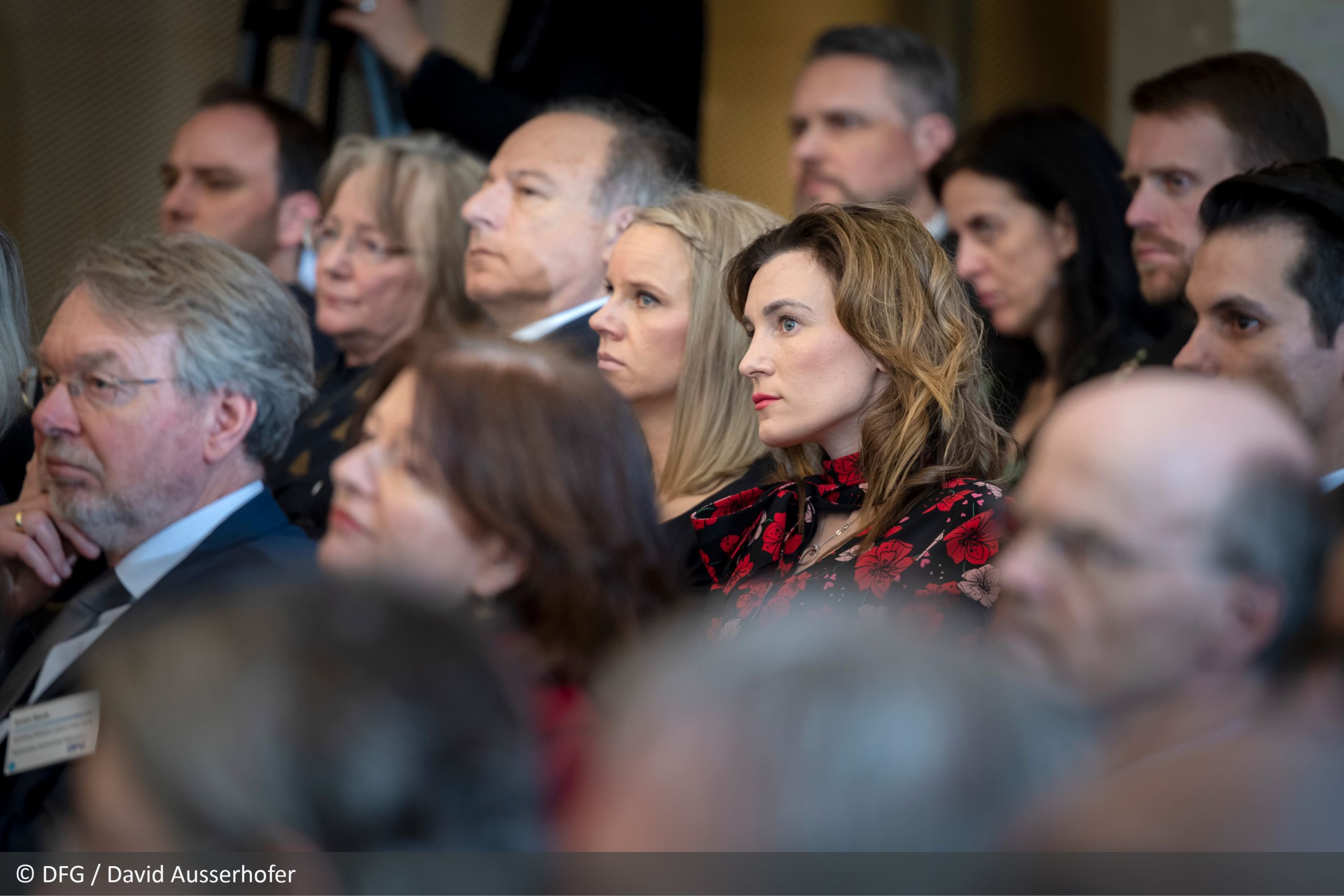
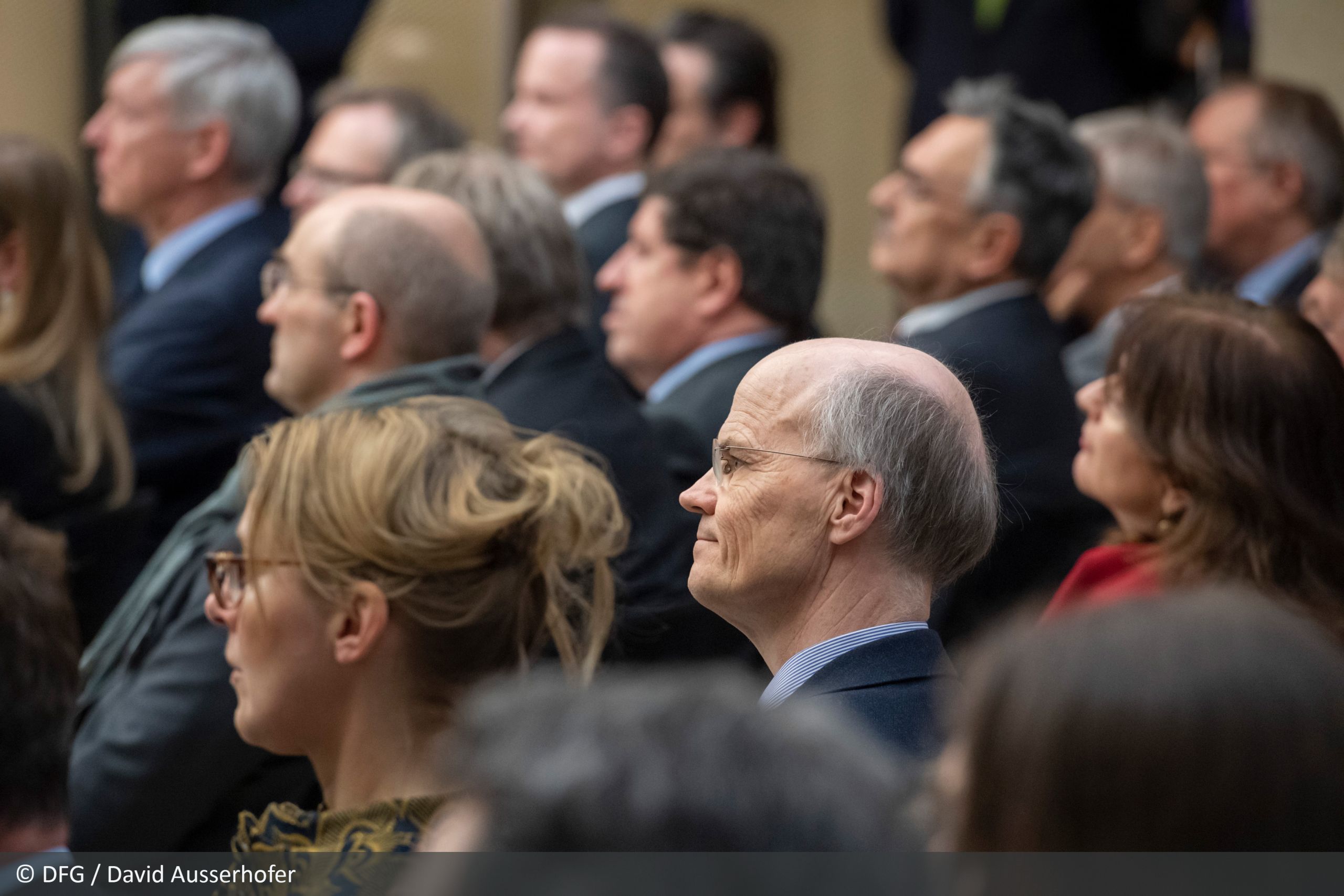
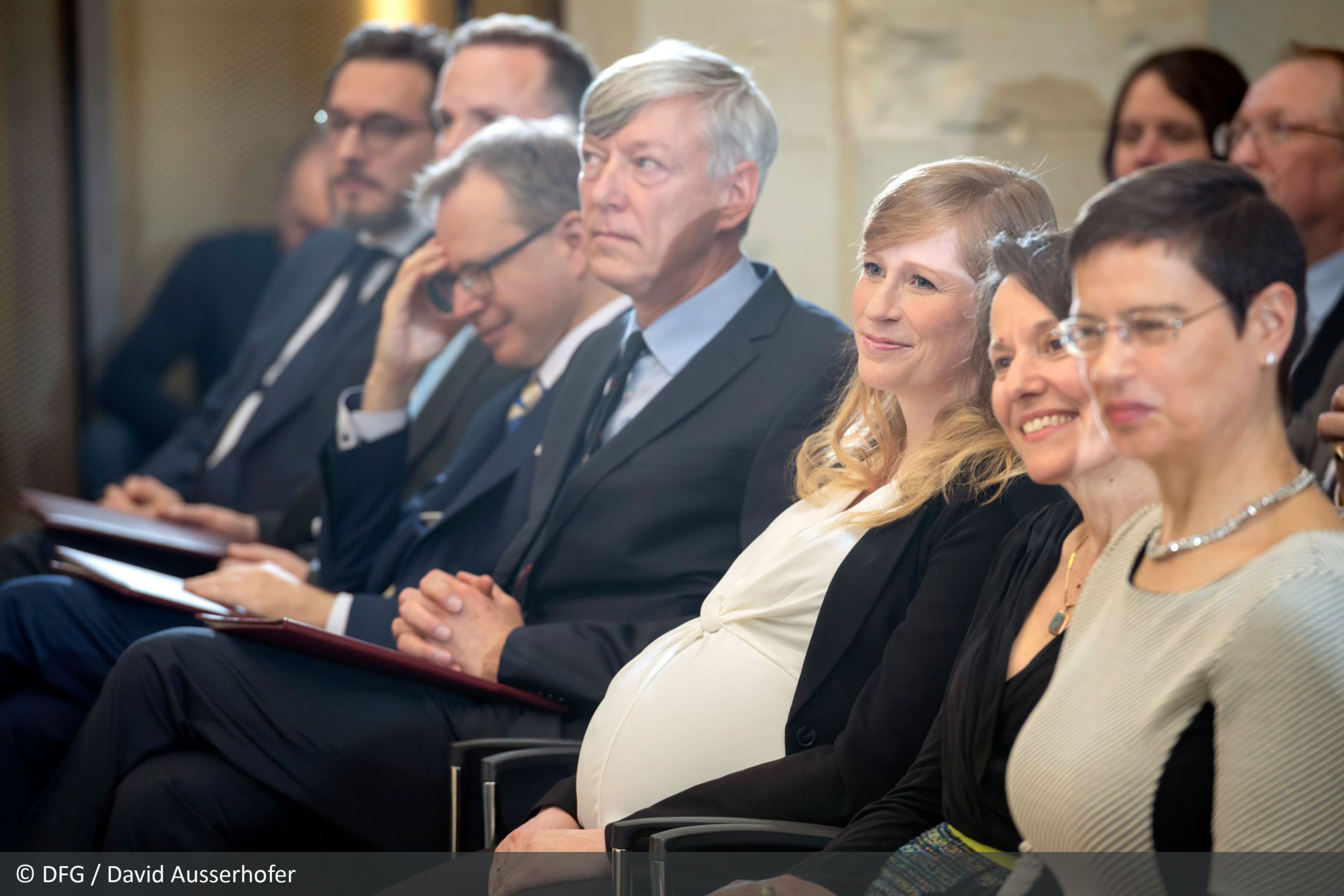
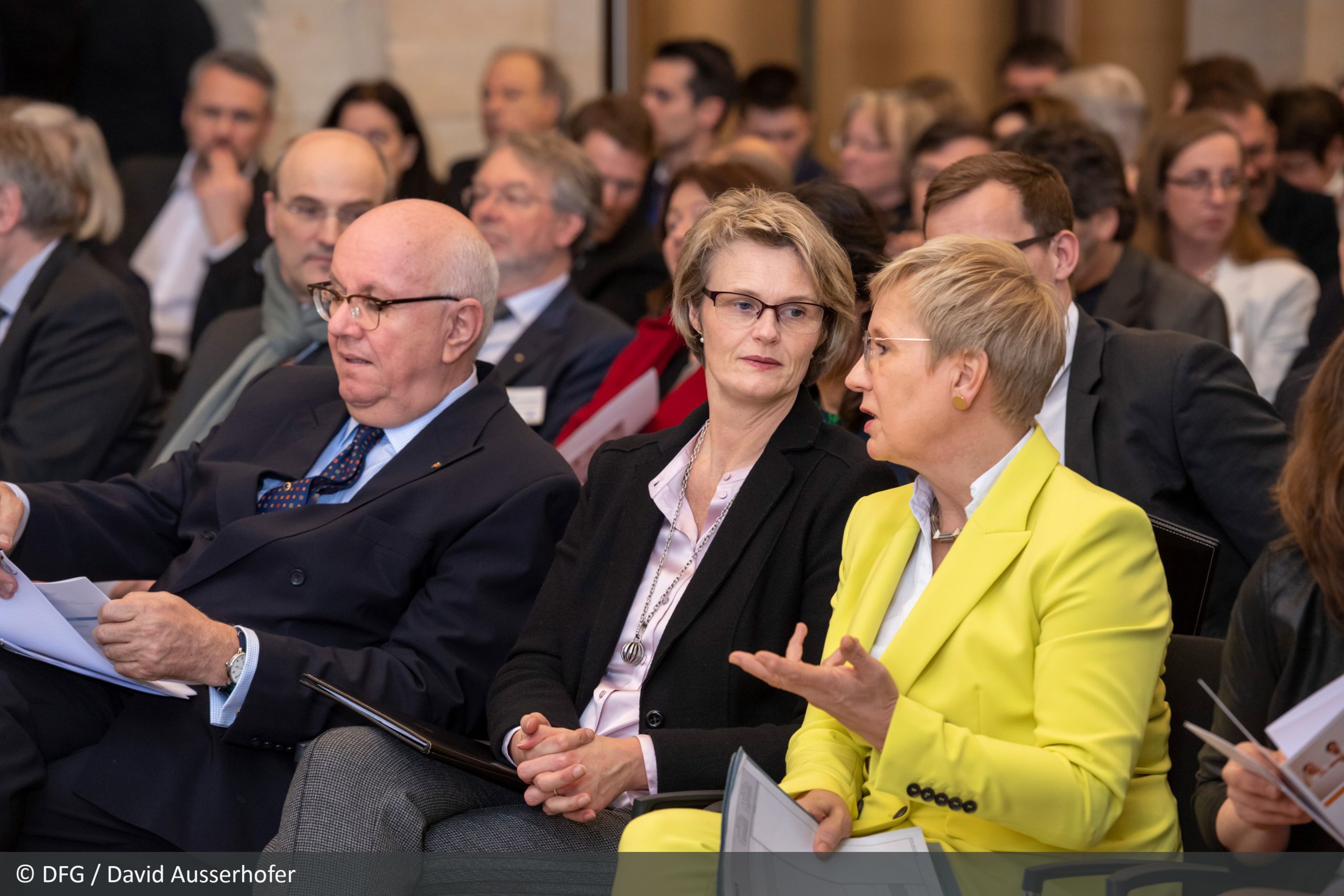
The Leibniz Prize Official Awards Ceremony
Berlin-Brandenburg Academy of Sciences and Humanities
March 13, 2019
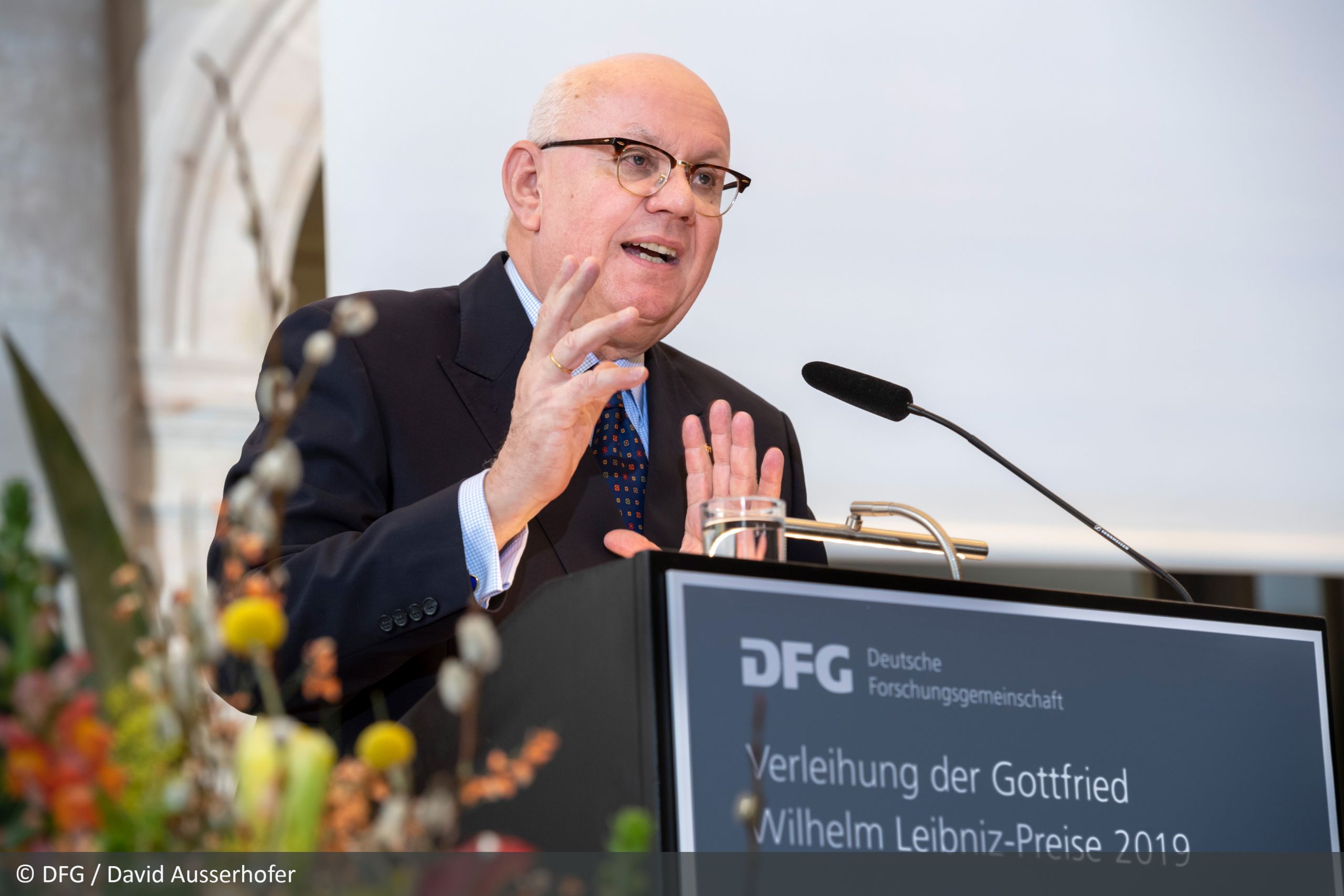
DFG President Prof Strohschneider
DFG President Prof Strohschneider
The President of the German Research Foundation (DFG), Prof Peter Strohschneider warmly welcomed the audience and the awardees, whom he praised as world-class scholars representing the highest level of individual scientific achievement. He masterfully presided over the 3-hour award ceremony, concisely and elegantly presenting the top-level achievements of each of the Leibniz Prize Laureates.
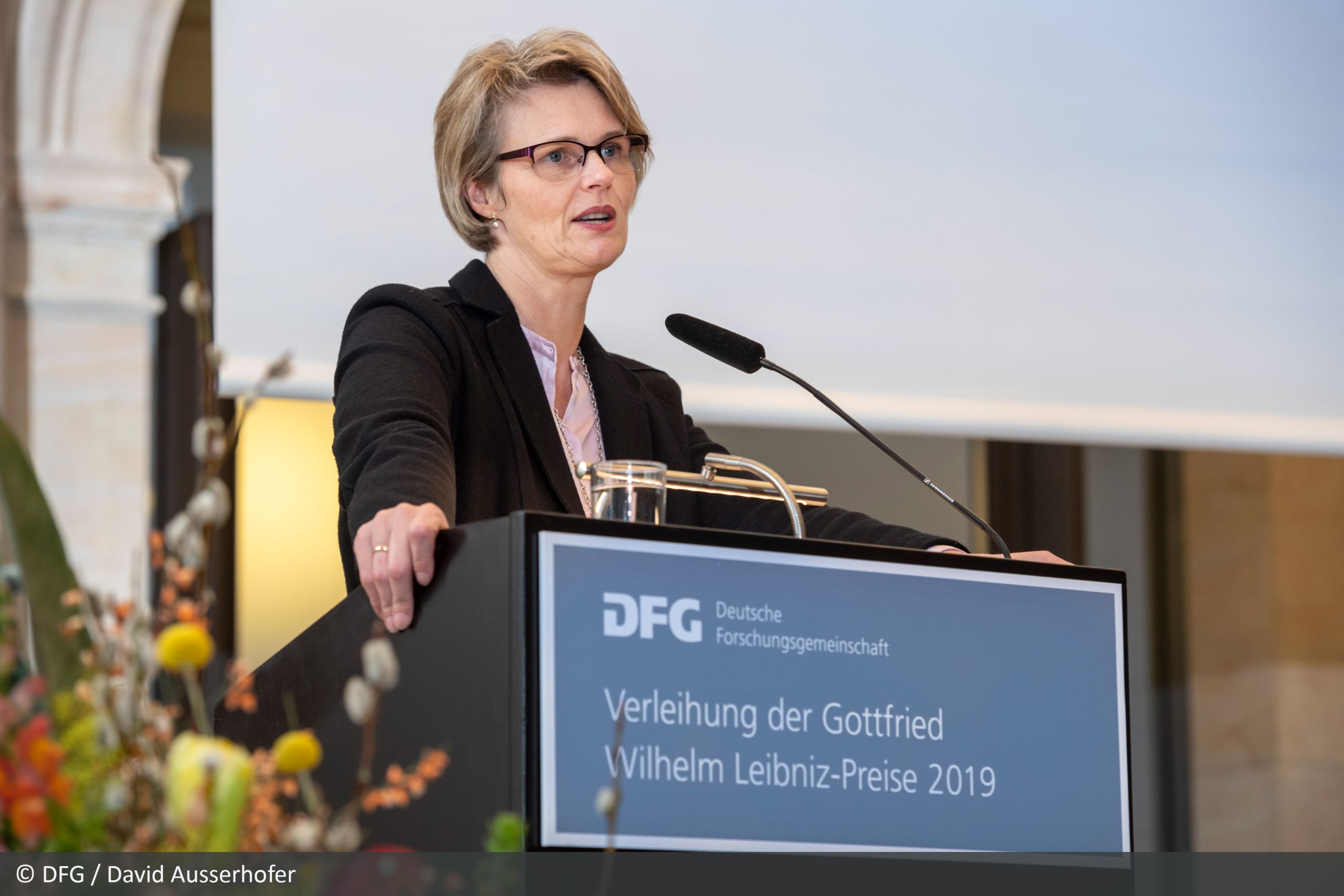
Federal Research Minister Anja Karliczek
Federal Research Minister Anja Karliczek
“The awarding of the Leibniz Prize is a celebration of the freedom of scholarship. It is also a festival of scientific excellence. Excellence and freedom of science go hand in hand." On the eve of celebrating the 70th anniversary of the Basic Law in May, the Federal Research Minister Anja Karliczek, called for the need to renew faith in science and in democracy. In opening a unique space of scientific freedom, the Leibniz Prize stands for the freedom of science, which is a cornerstone of democracy. "I want scientists who interfere," she said, by explaining and seeking dialogue. The credibility of science is the prerequisite for it to remain a viable pillar of our democracy.

Bremen’s State Minister of Science Prof Quante-Brandt
Bremen’s State Minister of Science Prof Quante-Brandt
Prof Eva Quante-Brandt, Bremen’s State Minister of Science and the Chairperson of the Joint Science Conference, underlined the grandeur of the Leibniz Prize: its “international appeal and the reputation associated with it are high. The fact that seven Nobel Laureates later emerged from the circle of those who have been awarded the prize speaks for the demanding selection procedure”. Quante-Brandt expressed her pleasure that four women are amongst the recipients in 2019, highlighting the importance of gender equality and equal opportunities in science. She also spoke about the freedom of research that is associated with the Leibniz Prize; such freedom is unfortunately not as self-evident as it should be worldwide. Quante-Brandt wished for the Laureates that the Leibniz Prize would be the foundation stone for essential research results: “If the prize money enables you to carry out research free of financial constraints that would otherwise not have been possible to the same extent, then the goal has been achieved”.
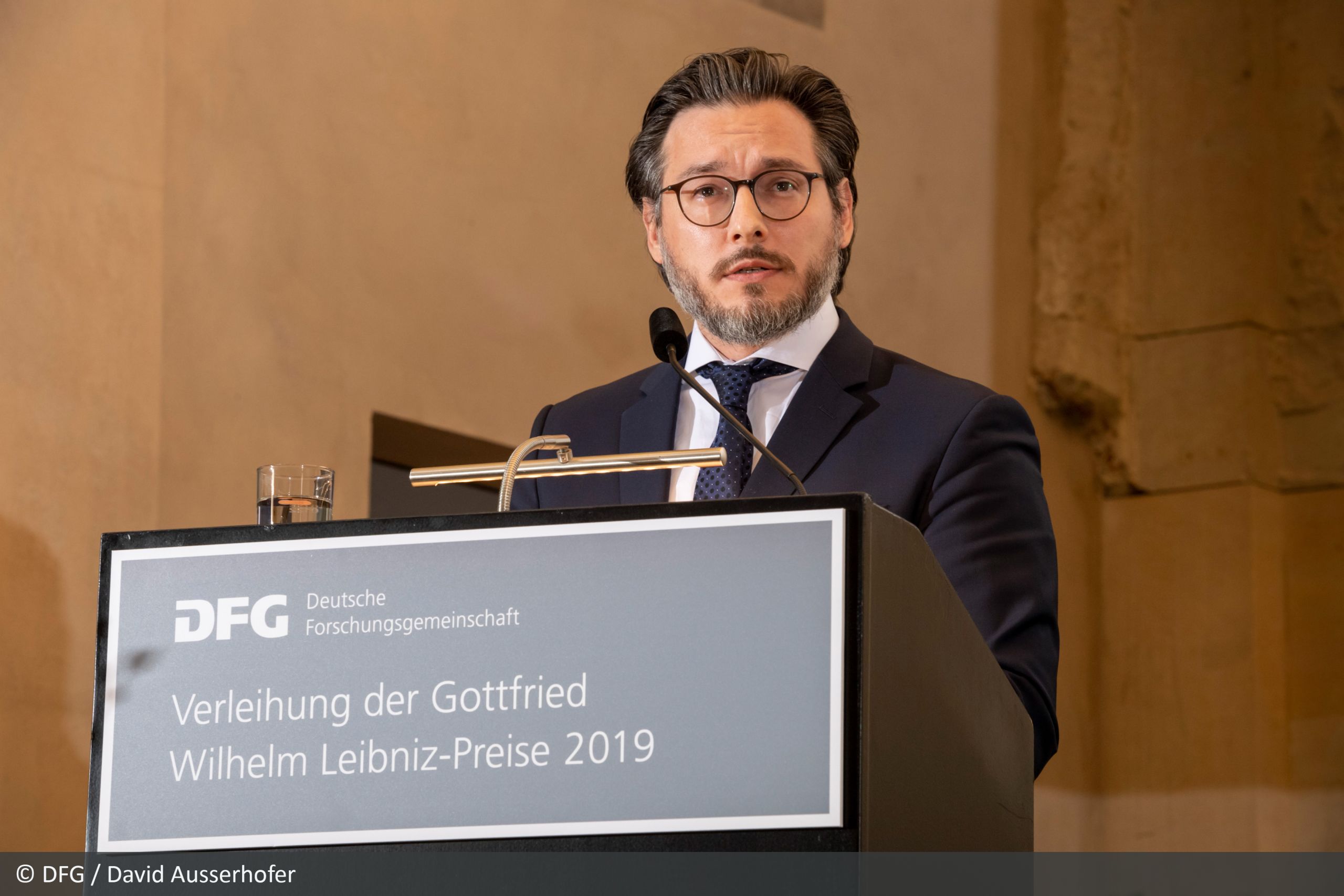
Prof Dr-Ing Sami Haddadin
Prof Dr-Ing Sami Haddadin
Robotics Scholar and Leibniz Laureate Prof Sami Haddadin spoke on behalf of all of the prizewinners. He drew attention to the inherent incongruence between the big questions that scholars ask, and the necessary but limited means and time available to address them. The Leibniz Prize, he said, would enable him and the other Laureates to bridge this incongruence: “over a period of seven years, we will pursue the things that concern us with emphasis, curiosity, but also with unbridled creativity”.
***
Link to the original press release: Leibniz Prizewinner 2019 Ayelet Shachar
For more information on Ayelet Shachar’s work, visit: The MPI MMG Department of Ethics, Law and Poltics.
Data protection information
The Max-Planck-Gesellschaft zur Förderung der Wissenschaften e.V. (MPG) takes the protection of your personal data very seriously. We process personal data gathered when visiting our websites in compliance with applicable data protection legislation. We neither publish your data nor transmit them to third parties on an unauthorized basis. In the following section, we explain which data we record when you visit one of our websites, and exactly how they are utilized:
A. General information 1. Scope of data processing
As a matter of principle, we gather and utilize users' personal data only to the extent required to ensure the functioning of our website and of our contents and services. The gathering and utilization of our users' personal data normally occurs after users have granted their consent. An exception occurs where data processing is legally permitted.
2. Legal basis of data processing To the extent that permission of the affected individual is obtained for the processing of personal data, Article 6 (1) lit. a of the EU General Data Protection Regulation (GDPR) serves as the legal basis.
In the processing of personal data to fulfil a contract whose contractual party is the individual affected, Article 6 (1) lit. b GDPR serves as the legal basis. This also applies to processing required to implement pre-contractual measures.
If processing is required to safeguard the justified interest of the MPG or a third party and the interests, basic rights and basic freedoms of the affected individual do not outweigh the first-mentioned interest, Article 6 (1) lit. f GDPR serves as the basis for such processing.
3. Data deletion and storage duration The affected individual's personal data are deleted or blocked as soon as the purpose of the storage ceases to apply. Storage can also occur if provided for by European or national legislators in EU regulations, acts or other legislation to which the MPG is subject. A blocking or deletion of data then occurs only if a storage period prescribed by one of the aforementioned norms expires, unless a necessity exists in relation to the further storage of the data for the arrangement of a contract or the fulfilment of a contract.
4. Contact details of the individuals responsible The entity responsible in the meaning of the General Data Protection Regulation and other national data protection acts as well as other data protection legislation is the
Max-Planck-Gesellschaft zur Förderung der Wissenschaften e.V. (MPG) Hofgartenstrasse 8 D-80539 Munich Telephone: +49 (89) 2108-0 Contact form: https://www.mpg.de/kontakt/anfragen Internet: https://www.mpg.de
5. Data Protection Manager's contact details The Data Protection Manager at the entity responsible is
Heidi Schuster Hofgartenstrasse 8 D-80539 Munich Telephone: +49 (89) 2108-1554 datenschutz(at)mpg.de
B. Provision of the website and creation of log files Each time you visit our website, our service and applications automatically record data and information from the computer system of the visiting computer.
The following data are gathered temporarily: Your IP address, Date and time of your access to the website, Address of the page visited, Address of the previously visited website (referrer), Name and version of your browser/operating system (if transmitted).
These data are stored in our systems' log files. These data are not stored together with the user's other personal data.
The legal basis for the temporary saving of data and log files is Article 6 (1) lit. f GDPR. Storage occurs in log files in order to ensure the website's functionality. The data also help us optimize the websites, eliminate malfunctions and ensure our IT system security. Our justified interest in data processing pursuant to Article 6 (1) lit. f GDPR also lies in such purposes.
The data are deleted as soon as they are no longer required to achieve the purpose for which they were gathered. If data are gathered for the provision of the website, this is the case if the respective visit is ended. In the instance that data are stored in log files, this is the case after seven days at the latest. Storage above and beyond this period is possible.
The recording of data for the provision of the website and the storage of data in log files is essential to operate the website. As a consequence, users do not have an option to revoke such data recording.
C. Web analysis For the statistical data recording of utilization behaviour, we deploy the Matomo web analysis program, which utilizes cookies and JavaScript to collect various information on your computer and transmit it to us automatically. Each time you visit our websites, our system records the following data and information from the visiting computer's computer system: IP address, anonymized by shortening; Two cookies to differentiate different visitors (pk_id and pk_sess); Previously visited URL (referrer), if communicated by the browser; Name and version of the operating system; Name, version and language setting of the browser.
Additionally, if JavaScript is activated: URLs visited on this website; Times at which pages are visited; Type of HTML queries; Screen resolution and colour depth; Formats and techniques supported by the browser (e.g. cookies, Java, Flash, PDF, WindowsMedia, QuickTime, RealPlayer, Director, SilverLight, Google Gears).
Data are stored and evaluated exclusively on a central server operated by MPG. Along with the central www.mpg.de website, it is utilized by most Max Planck institutes and many of the project websites allocated to MPG.
The legal basis for the processing of users' personal data is Article 6 (1) lit. f GDPR. Processing of users' personal data enables us to analyze our users' utilization behaviour. The evaluation of the data we obtain enables us to aggregate information about the utilization of our websites' individual components. This helps us constantly improve our websites and their user-friendliness. Our justified interest in data processing pursuant to Article 6 (1) lit. f GDPR also lies in such purposes. The anonymization of the IP address sufficiently takes into consideration users' interest in the protection of their personal data.
The data are deleted after the formation of the conclusive annual sums for access statistics.
It goes that saying that you are able to revoke data gathering. You have the following independent possibilities to revoke data recording by the central server:
In your browser, activate the do-not-track or do-not-follow settings. If these settings are active, our central server will not store any data relating to you. Important: The do-not-track instruction generally applies only for the device and browser in which you activate the setting. If you utilize several devices/browsers, you will need to separately activate do-not-track in all relevant locations.
Utilize our opt-out function. Click the following selection box https://www.mpg.de/privacy-policy/data-collection-opt-out in order to stop data recording or to reactivate it. If the selection box is deactivated, our central server will not store any data about you. Important: For the opt-out, we have to store a special recognition cookie in your browser. If you delete it or utilize another PC/browser, you will need to revoke data recording again on this page.
These data are not stored together with the user's other personal data.
D. Utilization of cookies Our website utilizes cookies. Cookies are text files stored in the Internet browser or by the Internet browser on the user's computer system. If a user visits a website, a cookie can be stored on the user's operating system. This cookie contains a sequence of characters enabling the browser to be clearly identified when visiting the website again.
We deploy cookies to make our website more user-friendly. Some elements of our website also technically require the identification of the visiting browser after a change of page. The following data are saved and transmitted in the cookies: Language settings (localization) of the browser: session cookie i18next; Session data (click path, pages visited, current language, and, where relevant, error messages for forms: session cookie MPG_session_r; Both cookies are deleted when the session is closed.
The legal basis for personal data processing while utilizing cookies is Article 6 (1) lit. f GDPR. The purpose of utilizing technically necessary cookies is to simplify the utilization of websites for users. Some of our website's functions cannot be offered without the utilization of cookies. For these, it is necessary that the browser can also be re-identified following a change of page. We require cookies for the following applications:
Transferring the browser's language setting: automatic selection of the homepage and spelling
User data gathered by technically necessary cookies are not utilized to prepare user profiles. Our justified interest in personal data processing pursuant to Article 6 (1) lit. f GDPR also lies in such purposes.
Cookies are stored on the user's computer, which transmits them to our site. For this reason, you, as the user, also have full control over the utilization of cookies. You can deactivate or restrict the transmission of cookies through changing your Internet browser settings. Cookies that have already been saved can be deleted at any time. This can also occur automatically. If cookies for our website are deactivated, you may find not all of the website's functions can continue to be utilized in full.
In addition, we also utilize cookies on our website to enable users' utilization behaviour to be analyzed. For more information on this topic, please refer to the information provided under C.
E. Rights of individuals affected As an individual whose personal data are gathered as part of the aforementioned services, you have, in principle, the following rights, to the extent that no legal exceptions are applicable in individual cases: Information (Article 15 GDPR), Correction (Article 16 GDPR), Deletion (Article 17 (1) GDPR), Restriction of processing (Article 18 GDPR), Data transmission (Article 20 GDPR), Revocation of processing (Article 21 GDPR), Revocation of consent (Article 7 (3) GDPR), Right to complain to the regulator (Article 77 GDPR). For the MPG, this is the Bavarian Data Protection Authority (BayLDA), Postbox 606, 91511 Ansbach.
25 May 2018
Imprint/Provider Identification
The following provides mandatory data concerning the provider of this website, obligations with regard to data protection, as well as other important legal references involving the Internet site of the Max Planck Institute for the Study of Religious and Ethnic Diversity (=http://www.mmg.mpg.de) as required by German law. Provider: The provider of this Internet site within the legal meaning of the term is the registered association Max Planck Society for the Advancement of Science e.V. Address: Max-Planck-Gesellschaft zur Förderung der Wissenschaften e.V. Hofgartenstrasse 8, 80539 Munich, Germany. Phone: +49 (89)2108-0, Internet: http://www.mpg.de/english/portal/index.html. Register of Societies and Associations: The Max Planck Society is registered in the Official Register of Societies and Associations at Berlin-Charlottenburg Local Court under the register number VR 13378 B. Representatives: The Max Planck Society is legally represented by its Board of Directors which, in turn, is represented by the President of the Society, Prof. Dr. Martin Stratmann and by Secretary General Rüdiger Willems. Value added tax identification number. The value added tax identification number of the Max-Planck-Gesellschaft zur Förderung der Wissenschaften e.V. is DE 129517720. Editor Responsible editor for the contents of the website of the Max Planck Institute for the Study of Religious and Ethnic Diversity is Dr. Norbert Winnige. Tel.: +49 (0)551 49 56 - 246, e-mail: winnige(at)mmg.mpg.de
Editor for the Social Media Sites of the Max Planck Institute for the Study of Religious and Ethnic Diversity is: Chris Kofri. Tel.: +49(0)551 49 56 - 127; e-mail: kofri(at)mmg.mpg.de
Legal Structure The Max Planck Society is a non-profit research facility which is organized as a registered association. All of the institutes and facilities of the Max Planck Society are largely autonomous in terms of organization and research, but as a rule have no legal capacity of their own.
Foreign Language Pages To the extent that parts of this Internet site are offered in languages other than German, this represents a service exclusively for staff and guests of the Max Planck Society who are not proficient in German.
Liability for Contents of Online Information: As the provider of contents in accordance with Section 7 Paragraph 1 of the Tele-Media Law, the Max Planck Society shall be responsible for any contents which it makes available for use in accordance with general legal provisions. The Max Planck Society makes every effort to provide timely and accurate information on this Web site. Nevertheless, errors and inaccuracies cannot be completely ruled out. Therefore, the Max Planck Society does not assume any liability for the relevance, accuracy, completeness or quality of the information provided. The Max Planck Society shall not be liable for damage of a tangible or intangible nature caused directly or indirectly through the use or failure to use the information offered and/or through the use of faulty or incomplete information unless it is verifiably culpable of intent or gross negligence. The same shall apply to any downloadable software available free of charge. The Max Planck Society reserves the right to modify, supplement, or delete any or all of the information offered on its Internet site, or to temporarily or permanently cease publication thereof without prior and separate notification.
15 May 2018
